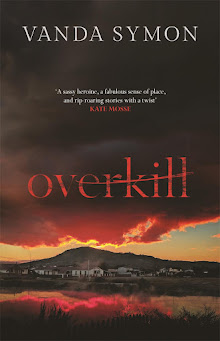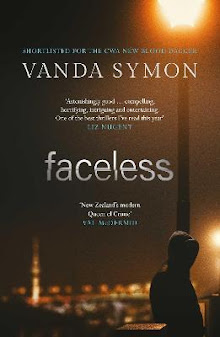At the same time the spiral is going out it is returning.
This session at the Burns Festival, with a line up of Keri Hulme, Rawiri Paratene, Renee and Witi Ihimaera was always going to be eventful, and it didn't disappoint! Billed as a session where these writers discussed their times as Burns Fellows, the place of Maori writing in New Zealand literature, and read from recent work, Witi Ihimaera managed to achieve all this as well as dealing with early exits, late entrances and joining in the beautiful waiata provided by two lovely maori women in the front row.
The stage was set with the ominously empty chair of Keri Hulme, Booker prize winner for The Bone People, who normally shying away from literary festivals these days, everyone had come to see.
Rawiri Paratene (1983) was first up to speak as he had to make an early exit to catch a 5.30 flight to Amsterdam to shuffle down the red carpet for his latest movie premiere where he stars with Rutger Hauer, such is the life of a movie star. He could also easily fill the role of stand up comedian, as his performance was warm and very funny.
Rawiri talked of the image of spirals in life, art and writing, and said that whether your stage in life was coming into our out of the spiral, the thing that bound us all together was that we were all the same, we were all story tellers, from the accomplished author, to the little baby.
In talking of the effect of the Burns Fellowship in his life, he said when he was selected for the fellowship, the greatest work of fiction he had written up to that point was his Burns application form. He embellished it somewhat, saying he was working on a play that would be performed at some later date. When advised he was on a short list for the fellowship and they would like to see a draft of the play he had to scramble to write it in five days!
The point he made was that he may not have been a real writer when he went in, but he was a real writer when he came out. When he'd applied for drama school and they asked him why he wanted to be an actor, he had said it was so he could come to write the dramas. The Burns fellowship game him that opportunity.
He made plenty of good hearted jibes about Keri Hulme not turning up, and kept saying "don't you fellas tell her I said that." Oops, sorry Rawiri.
He finished with a poem poking the borax at the USA, saying we live in an era where blame is really important, its convenient, and so performed the hilarious and active poem.
He was farewelled from the stage, in dramatic style with a waiata and wished well in his journey.
That left two on the stage, set for four, and the turn of Renee.
Renee (1989) captivated and entertained with a story talking of her youth, her rather overbearing mother, discovering the real cause of death of her father in Gore and the finding of George the fourth, a cat in a line of childhood cats named George, this one from the Tuki tuki river.
George the cat featured greatly in the story which spanned to when Renee was nineteen and looking after her sister who was being wooed by a young man, also named George. You can imagine the confusion for George the man thinking he was the George being yelled at to get off the bloody sofa! The story was so warmly and beautifully told and in other hands could easily have been like an Irish misery memoir.
Renee said she applied for the Burns Fellowship to be in Dunedin and be able to make peace with her father's shade, to visit Gore, look up family ties and to bury ghosts.
She was charming and warm hearted and made an amazing impression on this blogger.
Just when we thought all was lost on seeing Keri Hulme in the flesh, she was welcomed into the room with song, and a clearly flustered and mortified Keri apologised for being late. She'd had it fixed in her mind that the session was at 4.30pm, instead of the 3.30 kick off, and was hugely apologetic to the audience.
Witi Ihimaera (1975) took the centre stage next, to allow Keri to relax and compose herself.
Witi said that in 1975, when he was the fellow, the Maori sovereignty movement was gearing up and he felt a dilemma as to where he stood in identity and politically. He felt quite lost in terms of whakapapa or tradition.
He said Dunedin and "Scottytanga" embraced him and his wife, and his daughter was born here, so his time as the burns fellow was important personally, aesthetically and politically. He used the Burns Fellowship tenure as a crucial time to remove himself from early conservation work, such as Pounamu, Pounamu and to secure his political identity here.
Here he worked on the book Net Goes Fishing, and on editing a collection of Maori work Into the World of Light, which then went on to be a series of eight anthologies of Maori Writing.
During the Burns Fellowship he developed a determination to stay different in a country where blending was imperative. He talked of his grandmother questioning him when he came home from school when he was a child, what did you learn today? Jack and Jill. She questioned, who were Jack and Jill? Why did jack have a crown? If he was silly enough to wear one he deserved to break it, and importantly, why did they go up a hill to get water? The same treatment for Little Miss Muffet. Who was Miss Muffet? What was a tuffet? Curds and Whey? Why didn't she just say Kia ora to the spider and put it gently out of harms way?
From this a little Witi learned to question and not believing everything everyone told him. To champion and get to know the Man Friday, the indigenous.
He finished with a reading from a story Meeting Elizabeth Costello, which illustrated, complete with nursery rhyme reference his point.
For Witi Ihimaera the Burns Fellowship allowed time to explore and confirm his identity and politics.
Finally we got to hear from Keri Hulme (1977) and what she called her 6 month Mini-Burns.
Again she apologised for being late and was clearly still mortified by her misunderstanding. But she was gracious in her talking and shared of how for her the Burns Fellowship was her first opportunity of being paid to write, which was a huge thing for her. Her application had included a chapter of what was to become The Bone People.
The Burns Fellowship, as well as giving welcome financial support gave her three important things. Firstly, access to an amazing library and resources. Secondly, access to people with amazing critical thought and intellect with which to talk and discuss issues, and thirdly, the first version of The Bone People was rejected while here.
She also enjoyed the Otago Museum, as she was always fascinated by archeology and welcomed the opportunity to talk with archaeologists and befriend them.
She closed by reading excerpts from the story Midden Mine, a story of archeology and ownership, which highlighted some of these loves.
Te Torino was a session with grand exits and entrances, song, laughter, warmth and discovery. Again, I left feeling I had been a part of something very special, and felt blessed by it. This is proving to be an amazing festival.
Sunday, October 12, 2008
Subscribe to:
Post Comments (Atom)









3 comments:
It sounds wonderful, Vanda, thank you for writing it up so fully so we northeners can be part of it! Lucky you, how many writers festivals is that for you so far this year?
Dear Vanda,
What a memory you have!
I'm sure I would have forgotten everything after the tea break.
Do you take a pencil and pad in with you to these events?
Hi Mary, thanks for the link from your blog! That's three festivals this year - what a treat. This one has been particularly special with the Dunedin connection, and also the honesty and personal insights offered by the writers.
And yes, Hugh, I did take notes. I didn't for the first session and had to rely on memory, so seeing as there was so much information and it seemed so important I took notes for the other sessions. Glad I did as my memory is like a sieve and I'd never have recalled some of the gorgeous turns of phrase used by the writers.
Post a Comment